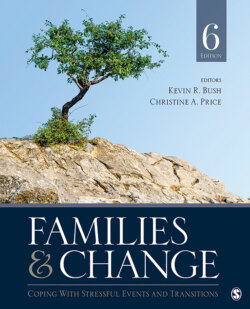Читать книгу Families & Change - Группа авторов - Страница 80
На сайте Литреса книга снята с продажи.
Parental Adaptation
ОглавлениеFamily stress theory also identifies adaptation as another important recovery factor, which refers to the ability of parents and other family members to recover from stress and crisis. Recovery in the family system and parent–child relationships may occur either by eliminating relationship disruptions and returning to preexisting patterns or by moving to new levels of relationship organization and stability (Hill, 1949; McCubbin & Patterson, 1983). Recently, the concept of adaptation has been expanded to view the recovery process as family resilience, which involves thinking about the multiple ways that parents and families face hardships, express strengths, and use protective factors to keep growing and changing (Henry et al., 2015).
A prominent example of parental adaptation research is the work on the experiences of parents following marital separation or divorce (Braver & Lamb, 2013; Demo & Buehler, 2013; Hetherington & Stanley-Hagan, 2002; Pedro-Carroll, 2011). Stress is a common experience for custodial mothers when role transitions are forced on them as ex-marital partners withdraw and become less involved in parental roles. Subsequently, many custodial mothers must shoulder new responsibilities as providers, build new support networks, and incorporate aspects of the father’s role into their parenting repertoires. Such changes often occur under difficult economic circumstances that contribute to psychological problems such as distress, anxiety, and depression. Subsequently, these negative mental health conditions place mothers at risk for declines in the quality of their performance as parents. During early phases of separation and divorce, custodial mothers who experience increased irritability and stress often become (a) less capable of monitoring children, (b) more permissive in their parenting, (c) more punitive in their parenting, and (d) more inclined to engage in coercive exchanges with children (Hetherington & Stanley-Hagan, 2002). Fortunately, the stressful circumstances for many of these mothers subside over time as they cope more effectively (Hetherington & Stanley-Hagan, 2002; Pedro-Carroll, 2011). A frequent outcome of a stressor or crisis initiated by divorce or separation is that parents eventually begin to define their situation as more manageable, actively cope more effectively to manage stress, and restore the quality of their child-rearing behavior approximately 1 to 2 years after the divorce stressor began (Braver & Lamb, 2013; Demo & Buehler, 2013; Hetherington & Stanley-Hagan, 2002; Pedro-Carroll, 2011).
